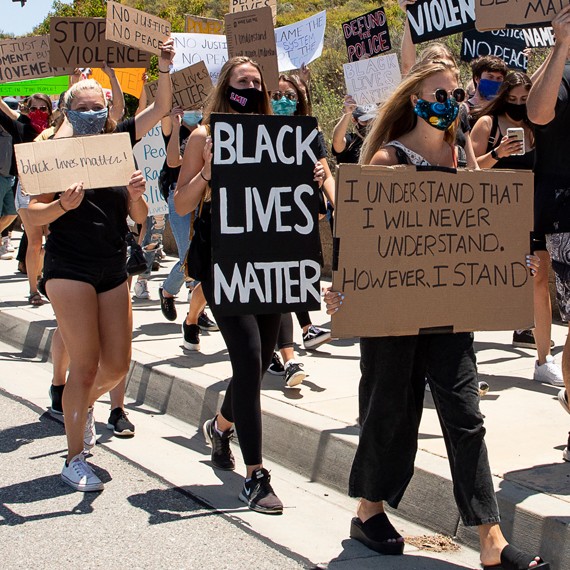
LMU ANTI-RACISM PROJECT | This past year, in line with the Ignatian tradition of discernment, LMU began the process of addressing demands from Black students, faculty, and staff. In doing so, we take steps to making the university a more diverse, equitable, and inclusive environment for all members of our community. From this perspective, as persons for and with others, we pay attention to the injustices around us so that we might commit ourselves, as Fr. Arrupe challenged us, to “…not merely resisting unjust structures and arrangements, but actively undertaking to reform them.” Expressing demands is a first step and we are glad to highlight, in addition to updates in response to #BlackatLMU and BFSA demands, Asian Pacific Islander Student Coalition (APISC) demands and responses, as well as responses to Latinx community concerns, as outlined by the Latino/a Staff Association (LSA) and Latino/a Faculty Association (LFA).
If the exchange of demands and initial responses represent the first step, however, what comes next? Here, we need to identify relationships between the concerns and demands of different groups on campus and the university’s strategic plan, which guides future decision-making, allocation of resources, and measures of success. Identification of key issues, whether expressed through broad statements written to “honor rage” or in poignant, pain-filled listening sessions, help us identify what corresponding actions are required. Demands uncomfortably direct our gaze to places where injustice and exclusion dwell, where processes and policies require revision, and where organizational culture needs to shift. By definition, it is challenging for institutional leaders to absorb these demands with open minds and hearts: to hear perceptions of institutional failure and urgent calls for change, and to process these, humbly, as opportunities for learning and sources of communal wisdom. Where does it all end, when demands and concerns seem to multiply? Can we be made whole? Will our common mission and shared commitment to LMU be enough to keep us together, as we work to strengthen LMU from such often-divergent social positions and cultural perspectives?
Continuing in this struggle for the institution’s future identity and students’ future educational experience is to collectively bring “the world we want to live in” into being. None of us may ever see the full embodiment of this institutional vision, and we probably hold different ideas about what this might look like, as well as how this vision might be realized. How do we keep moving toward a shared vision, especially when our perspectives are so different? On the one hand, groups making demands do so out of a desire to make LMU a better place, out of a commitment and love for the university despite its failures. Some groups also face the challenge of not automatically viewing the university and its leaders as the enemy or seeing every misstep as sure evidence of the university’s lack of commitment. Grace and mercy are helpful here. On the other hand, it is the responsibility of leaders receiving demands to remain open, to view demands as illuminating a path towards a stronger, more inclusive university, and as a way to fully respond to the signs of the times. To see groups making demands as partners, not as obstacles, towards shared goals. Understanding and generosity can greatly assist here. This common work of seeing the other, of strengthening the university from our different roles and perspectives, requires faith and the slow work of building trust. Then, despite our limitations, doubts, and cautions, we can continue the struggle, together.
The university’s next strategic plan gives us a specific arena to work towards these shared goals and vision. For instance, the Learning for Justice, Inclusion, and Transformation spotlight initiative will specifically focus on anti-racism and values of diversity, equity, and inclusion in the educational experiences of our students. The objectives and actions for this initiative closely align with issues raised in the demands from different groups, such as increasing the diversity of faculty, staff, and students from historically underrepresented and marginalized groups. Decolonizing the curriculum. Supporting faculty, staff, and students from historically underrepresented and marginalized groups. To make this happen, what resources and actions will be needed? We need to identify underlying principles, uplift specific issues, and create appropriate measures of progress for our university’s strategic plan—this is the next step we take. Together.
OIA Buzz
- In collaboration with the Offices of Undergraduate Education and Intercultural Affairs, the Arrupe Diversity, Equity, and Inclusion Award is reserved for a graduating senior who has shown a record of explicit work with diversity, equity, and inclusion (DEI) issues. The award is named in honor of Jesuit Superior General Father Pedro Arrupe, S.J., who worked tirelessly for the promotion of justice in the service of The awardee is selected by the University Intercultural Council (UIC) who selects a student who demonstrates both robust academic achievement and outstanding DEI academic contributions.

Join us in congratulating the first Arrupe DEI Award winner, Elsie Mares!
Elsie is a Political Science major and Economics minor and current vice president of ASLMU.More on Elsie and other recognized student leaders can be read here.
Watch the recent Academic Awards Convocation event here.
- Cultural Consciousness Conversations is a year-long commitment that touches participants for much, much longer. Participants describe it as a “tough program” that “makes you think deeply and feel deeply” in an “intentional [space to] exploring culture in its many forms.” All faculty, staff, and administrators are welcome to join. Sign up to receive more information on the 2021-22 cohort.
- JOIN US on April 29 at 4 p.m.
Reset the Room: Presenting Equity Through Narrative
Organized by the Brothers of Consciousness, this event will feature eight new Black entrepreneurs who will share their personal stories and insights.Register for the event here.
- The In Six Words project is continually accepting submissions. All LMU community members deserve to be seen, heard, and understood. These stories explore our hopes, our fears, our anger and joy, our everyday thoughts and experiences that we may or may not have the space to share in our current setting, our perspectives on the present, our reflections of the past, and our diverse outlooks for the future. This collection of stories shows that there is no wrong way to express the heart of our community. Some are poetic while others are prosaic, some call for action and others ask poignant questions, some are personal reflections while others are outward statements, and ALL are valid. Thank you for your submissions so far. Let’s continue the conversation – submit your own story here.



